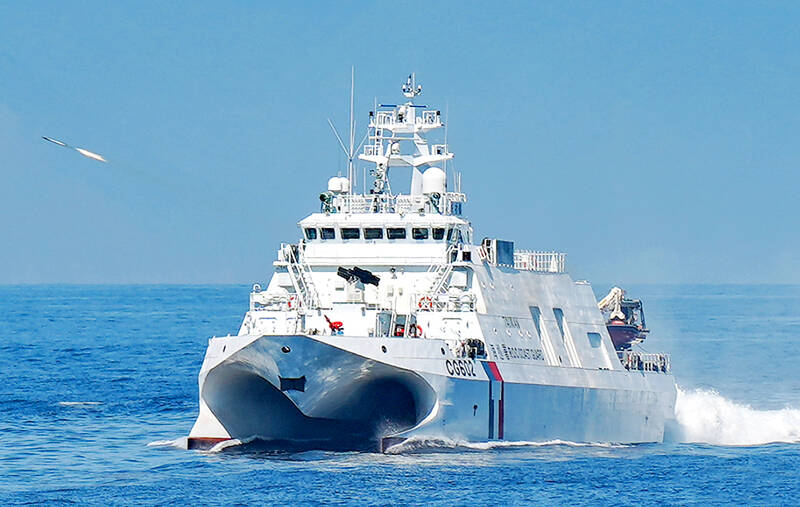The Executive Yuan has approved a Coast Guard Administration (CGA) plan to buy less-lethal weapons to avoid unnecessary risks to life while countering China’s “gray zone” actions, a senior official said yesterday.
The plan, which is to be conducted on a trial basis from next year to 2027 with an NT$86.24 million (US$2.72 million) budget, was approved earlier this month, the official said, speaking on condition of anonymity.
The CGA would procure 70mm rockets with “shock warheads,” 40mm flashbang grenades, stand-alone grenade launchers with single shot capacity and less-lethal handguns, they said.

Photo: Taipei Times file
Shock warheads would be better suited to maritime law enforcement missions than highly explosive, anti-armor loadings used in Chen Hai rocket systems on the coast guard’s Tuo Chiang-class corvettes, they said.
A defense official who also spoke on condition of anonymity said that shock rockets likely referred to a variant of the 70mm rockets developed by the Chungshan Institute of Science and Technology with a high-decibel sound to deter targets.
The institute would produce the munition based on the quantity and time specifications of the Ocean Affairs Council, they said.
Chen Hai rocket launchers are the main armament of Tuo-chiang class corvettes, with six systems equipped on each ship.
Separately, Taiwan on Friday received the first batch of land-based Harpoon anti-ship missile systems from the US, a military source said.
The source did not mention what equipment or system was included in the shipment, but said that the delivery was made via the Port of Kaohsiung.
The batch of arms is part of 32 vehicle launcher systems and 128 missiles that are to be delivered before 2026. They were purchased as part of a NT$71 billion deal of 100 systems, 400 missiles, four exercise missiles, 411 containers and 25 radar trucks, delivery of which is planned to be completed by 2028.
Installing and activating these systems would cost another NT$15.6 billion.
The RGM-84L-4 Harpoon Block II missiles earmarked for Taiwan are the most modern version of the Harpoon system, which the US is phasing out in favor of the Naval Strike Missile, the source said.
The Harpoon is a battle-tested system that has performed well in decades of operations, and its performance should meet the requirements for defending the seas around Taiwan, they said.
The RGM-84L-4 Harpoon Block II missiles designated for Taiwan are more advanced than the version used by the US Navy and have a greater effective range than the Taiwanese navy’s Hsiung Feng II anti-ship missiles, they said.
The radar trucks offered in the package would provide a mobile and survivable backup to fixed installations to boost Taiwan’s military command and control, they said.
The armed forces’ plan to establish a littoral combatant command in 2026 to control four strike groups and six land-based anti-ship missile bases are in progress, the Ministry of National Defense said.

Right-wing political scientist Laura Fernandez on Sunday won Costa Rica’s presidential election by a landslide, after promising to crack down on rising violence linked to the cocaine trade. Fernandez’s nearest rival, economist Alvaro Ramos, conceded defeat as results showed the ruling party far exceeding the threshold of 40 percent needed to avoid a runoff. With 94 percent of polling stations counted, the political heir of outgoing Costa Rican President Rodrigo Chaves had captured 48.3 percent of the vote compared with Ramos’ 33.4 percent, the Supreme Electoral Tribunal said. As soon as the first results were announced, members of Fernandez’s Sovereign People’s Party

MORE RESPONSIBILITY: Draftees would be expected to fight alongside professional soldiers, likely requiring the transformation of some training brigades into combat units The armed forces are to start incorporating new conscripts into combined arms brigades this year to enhance combat readiness, the Executive Yuan’s latest policy report said. The new policy would affect Taiwanese men entering the military for their compulsory service, which was extended to one year under reforms by then-president Tsai Ing-wen (蔡英文) in 2022. The conscripts would be trained to operate machine guns, uncrewed aerial vehicles, anti-tank guided missile launchers and Stinger air defense systems, the report said, adding that the basic training would be lengthened to eight weeks. After basic training, conscripts would be sorted into infantry battalions that would take

GROWING AMBITIONS: The scale and tempo of the operations show that the Strait has become the core theater for China to expand its security interests, the report said Chinese military aircraft incursions around Taiwan have surged nearly 15-fold over the past five years, according to a report released yesterday by the Democratic Progressive Party’s (DPP) Department of China Affairs. Sorties in the Taiwan Strait were previously irregular, totaling 380 in 2020, but have since evolved into routine operations, the report showed. “This demonstrates that the Taiwan Strait has become both the starting point and testing ground for Beijing’s expansionist ambitions,” it said. Driven by military expansionism, China is systematically pursuing actions aimed at altering the regional “status quo,” the department said, adding that Taiwan represents the most critical link in China’s

‘REALLY PROUD’: Nvidia would not be possible without Taiwan, Huang said, adding that TSMC would be increasing its capacity by 100 percent Nvidia Corp CEO Jensen Huang (黃仁勳) on Saturday praised and lightly cajoled his major Taiwanese suppliers to produce more to help power strong demand for artificial intelligence (AI), capping a visit to the country of his birth, where he has been mobbed by adoring fans at every step. Speaking at an impromptu press conference in the rain outside a Taipei restaurant, where he had hosted suppliers for a “trillion-dollar dinner,” named after the market capitalization of those firms attending, Huang said this would be another good year for business. “TSMC needs to work very hard this year because I need a lot